Unit 6 Enjoying CyclingTopic 2 Section A课件(共32张PPT) 2024-2025学年英语仁爱版八年级下册
文档属性
| 名称 | Unit 6 Enjoying CyclingTopic 2 Section A课件(共32张PPT) 2024-2025学年英语仁爱版八年级下册 | 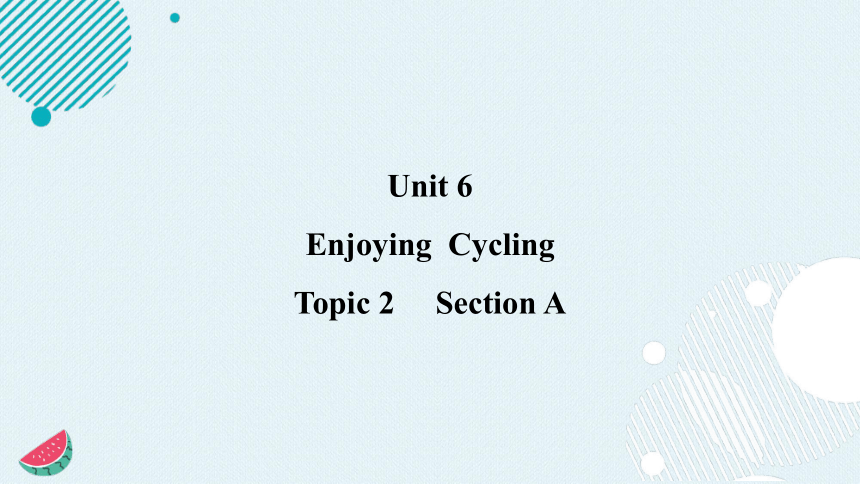 | |
| 格式 | pptx | ||
| 文件大小 | 3.0MB | ||
| 资源类型 | 教案 | ||
| 版本资源 | 仁爱科普版 | ||
| 科目 | 英语 | ||
| 更新时间 | 2024-11-23 23:53:41 | ||
图片预览


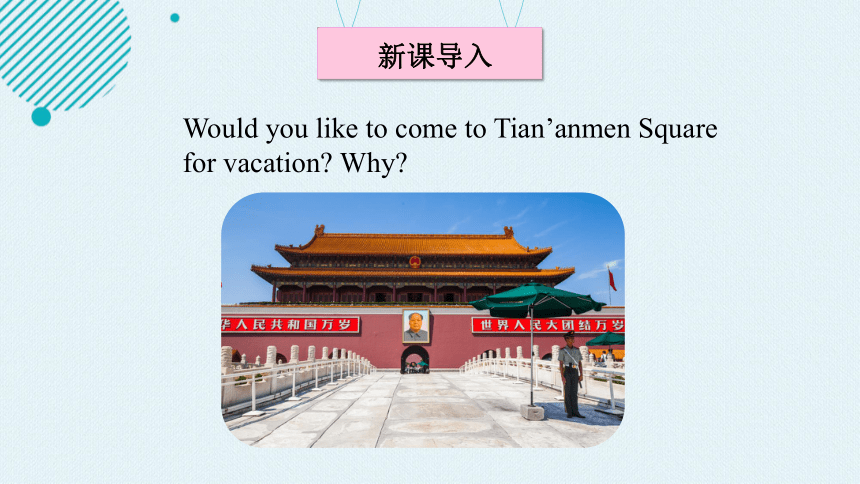
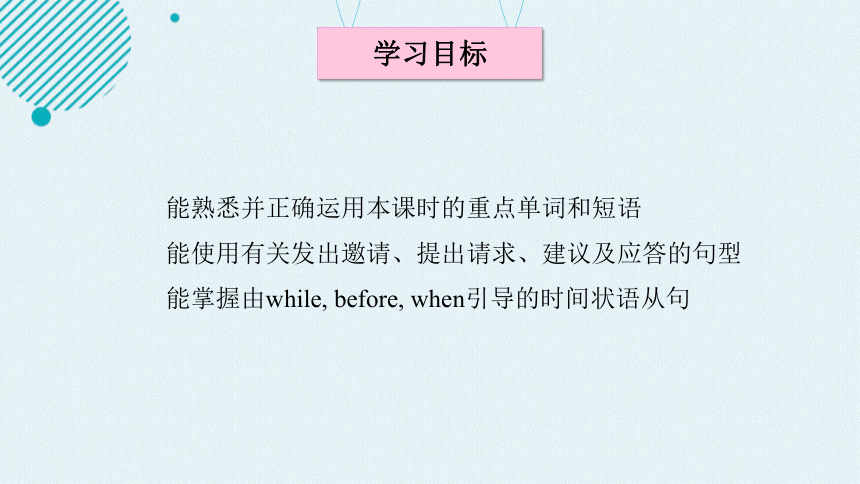
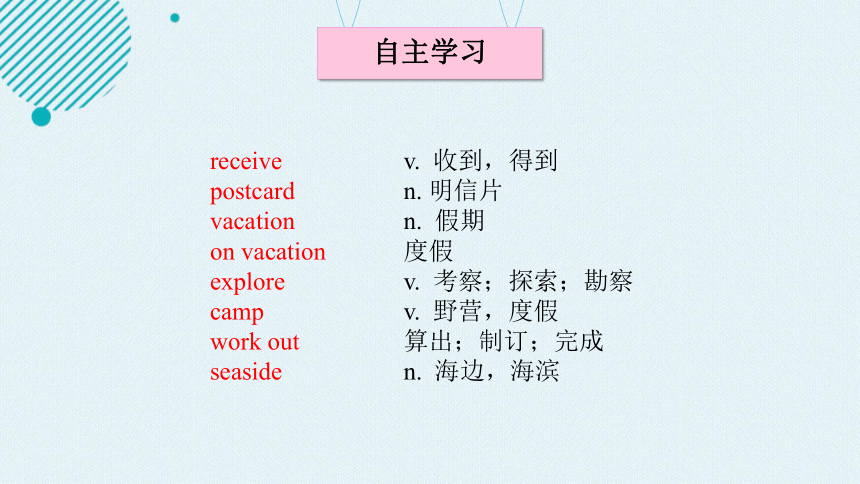
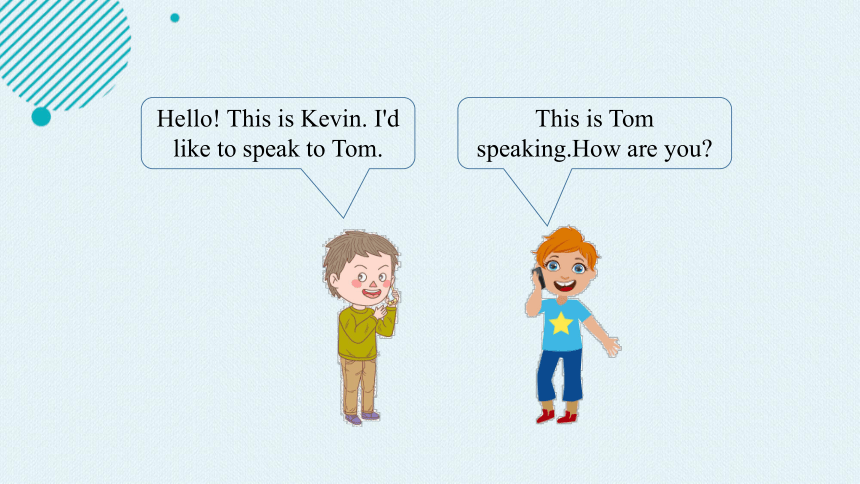
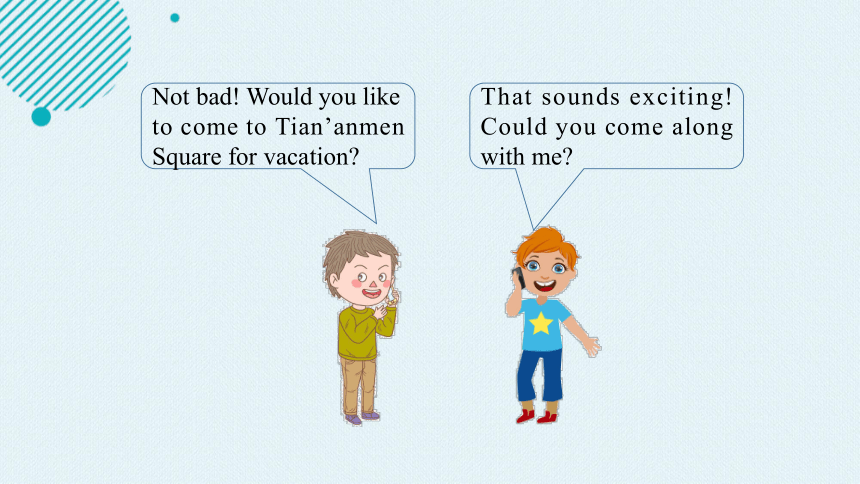
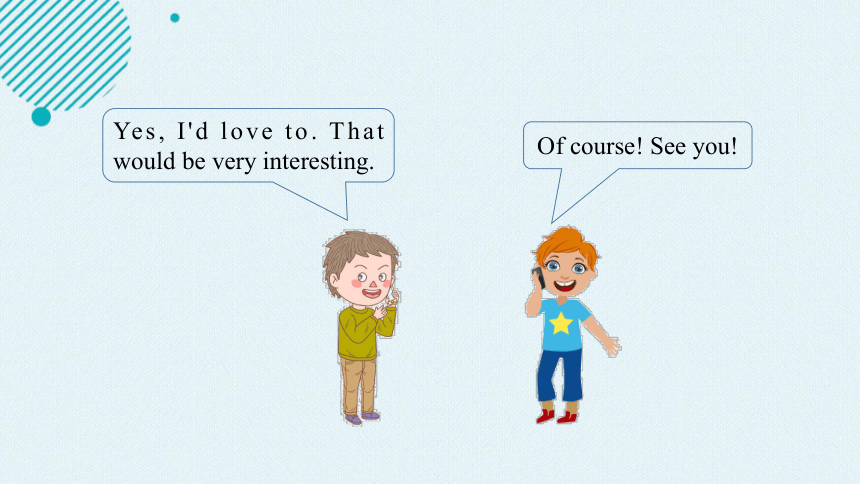
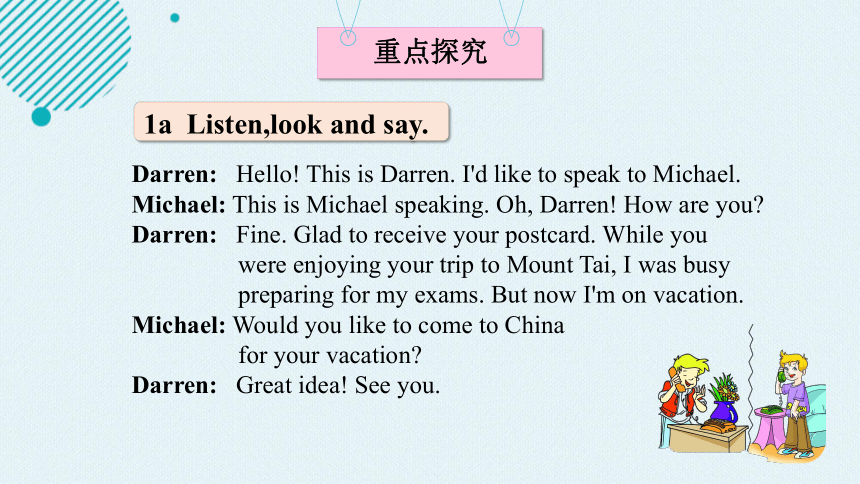
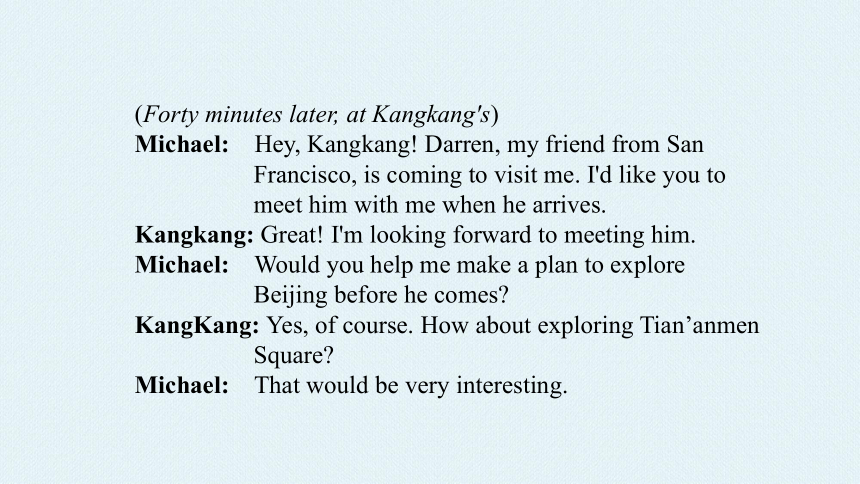
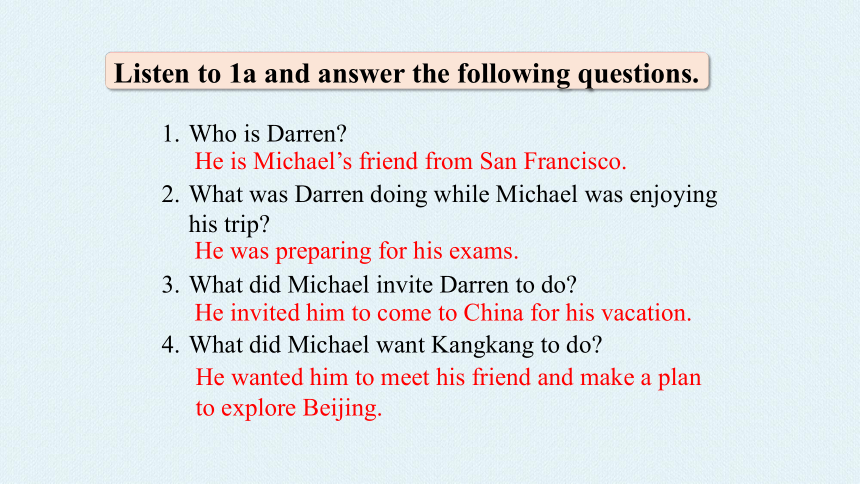
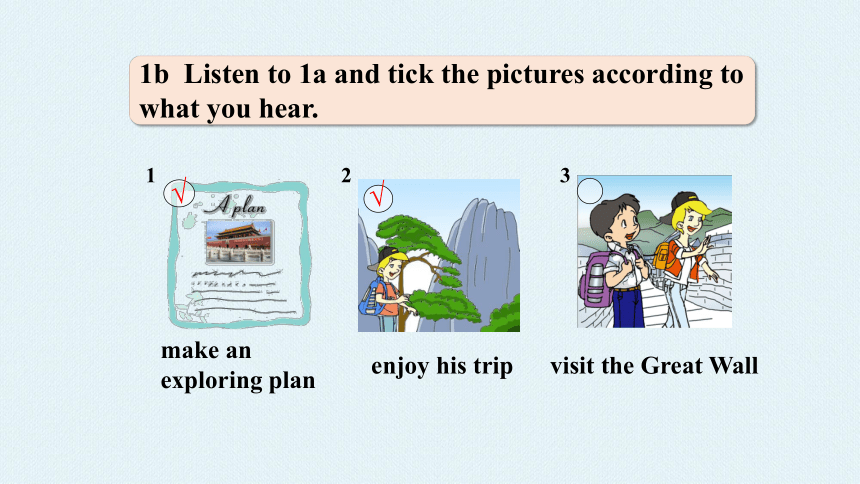
文档简介
(共32张PPT)
Unit 6
Enjoying Cycling
Topic 2 Section A
学习目标
重点探究
自主学习
学习导航
当堂检测
课堂总结
拓展提升
新课导入
Would you like to come to Tian’anmen Square for vacation Why
学习目标
能熟悉并正确运用本课时的重点单词和短语
能使用有关发出邀请、提出请求、建议及应答的句型
能掌握由while, before, when引导的时间状语从句
自主学习
receive v. 收到,得到
postcard n. 明信片
vacation n. 假期
on vacation 度假
explore v. 考察;探索;勘察
camp v. 野营,度假
work out 算出;制订;完成
seaside n. 海边,海滨
Hello! This is Kevin. I'd like to speak to Tom.
This is Tom speaking.How are you
Not bad! Would you like to come to Tian’anmen Square for vacation
That sounds exciting! Could you come along with me
Yes, I'd love to. That would be very interesting.
Of course! See you!
重点探究
Darren: Hello! This is Darren. I'd like to speak to Michael.
Michael: This is Michael speaking. Oh, Darren! How are you
Darren: Fine. Glad to receive your postcard. While you
were enjoying your trip to Mount Tai, I was busy
preparing for my exams. But now I'm on vacation.
Michael: Would you like to come to China
for your vacation
Darren: Great idea! See you.
1a Listen,look and say.
(Forty minutes later, at Kangkang's)
Michael: Hey, Kangkang! Darren, my friend from San
Francisco, is coming to visit me. I'd like you to
meet him with me when he arrives.
Kangkang: Great! I'm looking forward to meeting him.
Michael: Would you help me make a plan to explore
Beijing before he comes
KangKang: Yes, of course. How about exploring Tian’anmen
Square
Michael: That would be very interesting.
Who is Darren
What was Darren doing while Michael was enjoying his trip
What did Michael invite Darren to do
What did Michael want Kangkang to do
He is Michael’s friend from San Francisco.
He was preparing for his exams.
He invited him to come to China for his vacation.
He wanted him to meet his friend and make a plan to explore Beijing.
Listen to 1a and answer the following questions.
visit the Great Wall
enjoy his trip
make an exploring plan
√
√
1
2
3
1b Listen to 1a and tick the pictures according to
what you hear.
v. 收到
receive a postcard
meet their friend
√
√
4
5
( ) Michael invites Darren to visit China.
( ) Darren is on vacation.
( ) Kangkang helps Michael make a plan for Darren’s visit.
( 1 ) Darren receives a postcard from Michael.
( ) Michael and Kangkang will meet Darren.
3
2
4
5
1c Read 1a and number the following sentences.
Then try to retell it.
Key words:
speak to, receive, postcard, trip, exams, vacation, would you like…,
from, meet, look forward to, plan, explore, Tian’anmen Square
Act the dialogue out with your partners.
Would / Will you help me plan a trip
Could / Can you come along with us
Shall we take him there
All right.
No, let’s not.
Sorry, I’m afraid I have no time.
Yes, I can.
Yes, I’d love to.
I’m sorry I can’t.
2 Read and match the sentences.Then find more similar
expressions from 1a and practice with your partner.
Would you help me make a plan to explore Beijing
How about exploring the Tian'anmen Square
Would you like to come to China for your vacation
Good idea!
Yes, of course.
That would be very interesting.
表示建议、请求、同意的句子:
have a class / climb
run / swim
dance / sing
Example:
Darren was having a class while Michael was climbing a mountain.
Maria was swimming while Jane was running.
Michael was singing while Jane was dancing.
3 Look at the pictures and make sentences
with while or when.
read / come in
watch / ring
write / knock at
Example:
Darren was reading when Michael came in.
Kangkang was watching TV when the telephone rang.
Kangkang and Jane were writing when Michael knocked at the door.
连词 “when”
“when” means “at or during the time that…”,既可指一个时间点,又可指一个时间段,所以从句中既可以用延续性动词也可以用短暂性动词。
例:
I was chatting with my friends on the Internet
in my study when my mother came in.
连词“while”
“while” means “during the time that something is happening” or “at the same time as sth. is happening” ,从句中只能用延续性动词, 表示主句与从句动作同时发生。
例:
I was doing my homework while my sister was playing games.
while也可以作名词,表示“一段时间, 一会儿”。如:for a while, after a while
1. Diana’s perfect holiday activity is ______.
A. riding B. camping C. fishing
2. Diana and Lily should ______ for the holiday.
A. learn to swim in the sea.
B. know more about camping
C. work out the cost carefully
3. Where do they decide to go finally
A. Go to the seaside. B. Camp in the forest.
C. We don’t know.
算出,解决to find out the answer or to solve sth.
4 Listen to the conversation and choose the
correct answers.
Language points
拓展提升
1. I’m looking forward to meeting him. 我盼着与他见面。
look forward to 意为“期待,盼望”,to 是介词,后
面可加名词、代词或动名词;
e.g. He is looking forward to going abroad.
他期待去国外。
2. Would you help me make a plan to explore Beijing before he comes
在他来之前,你能帮我制订一个探索北京的计划吗?
1) would you 比will you 语气更加客气,委婉, 类
似还有:could you.......
e.g. Could you come along with us
你要和我们一起吗?
2) A. make a plan to do sth.制订计划做某事;
e.g. The boy made a plan to visit around the world.
男孩制订了一个环游全世界的计划。
B. make a plan for sth.为某事制订计划
e.g. I made a plan for my summer vacation.
我为我的暑假制订了一个计划。
3) explore 动词, 意为“考察(某地区),探险,勘察”
e.g. He went out to explore.他出去考察了。
扩展:explorer 名词,意为“探险家,探测者”;
e.g. She wants to be an explorer when she grows up.
当她长大后,她想成为一名探险家。
3. Would you help me plan a trip
请你帮我定个旅行计划好吗?
1) A. Would 与you 连用表示请求或要求;won’t
you加强邀请的语气。但would 比will语气更加客气,
委婉。
e.g. Will you come this way, please 请这边走好吗?
Won’t you coming in and take a seat
你怎么不进来找个位子坐下?
B. Will you.... 和 Would you.... 在表达“请求”时用
法完全一样,其答语也相同。只是后者更有礼貌。 e.g. —Will /Would you have some more tea
再喝点茶,好吗?
—Yes, please. 好的。 / No, thank you. 不,谢谢。
2)trip 作可数名词,意为“旅行,旅程”。 动词短语 plan a trip 意为“制定旅行计划”。
4. Could/Can you come along with us
你和我们一起来好吗
1)在表达请求别人做某事常用can/ could,could 更
礼貌。肯定回答时用:can/may, 不用could。
e.g. —Could/ Can I ask you a question, Mr. Lee
李老师,我可以问你一个问题吗?
—Yes, of course you can. 当然可以。
2)come along (with) 意为“跟着来,跟随”;
e.g. Ray had some work to finish and decided to come
along later.
雷还有些工作要做完,决定迟点儿再来。
5. Shall we take him here
我们带他去那儿好吗?
A.shall和 will 都用与一般将来时,但shall 只用于第
一人称。
e.g. I shall/ will buy a computer this Sunday.
这个礼拜天我将买一台电脑。
B.Shall we/I..... 表示向对方征求意见,提出建议,
意为“……好吗?”
e.g. Shall we go swimming tomorrow
我们明天去游泳好吗?
6. Darren was reading a newspaper when Michael came in.
当迈克尔进来时,达伦正在看报纸。
此句也可以改成:Michael came in when/while Darren
was reading a newspaper.
while引导的时间状语从句,用于表达持续性的动词
或状态,不能与表示短暂性动词连用,但when两者
皆可以。
当堂检测
一、根据句意及首字母或汉语提示完成句子。
1. —What are they doing in front of the class
—They are _________ ____ (为……做准备) new lessons.
2. —I'm afraid that I can't ______ ______ (算出) the math problem.
—Try your best. You’ll find a way.
3. —Do you hear from your pen pals
—Yes. I r______ their letters every month.
4. —What a nice p______!
—My friend sent it to me yesterday.
5. —Would you like to spend summer v______ with me
—Sure. I’d love to.
preparing for
work out
eceive
ostcard
acation
课堂总结
Unit 6 Topic 2
Section A
重点单词和短语:
receive, postcard, vacation, on vacation, work out,on vacation, look forward to
while, when等连词引导的时间状语从句:
引导时间状语从句的连接词有1______ ,2.______ 等。主句是一般将来时,从句用3.__________(时态)。主句是过去时,从句也要用相应的时态。
对方发出邀请、提出请求和建议及回答:
表示建议的句型Would/ will you… Could/Can you… 以及Shall we... 其肯定回答是:
1. ____________或2._________. 否定的回答是:3._____________或4.______________________.
when
一般现在时
Yes, I’d love to
All right
while
I’m sorry I can’t.
No, let’s not.
Unit 6
Enjoying Cycling
Topic 2 Section A
学习目标
重点探究
自主学习
学习导航
当堂检测
课堂总结
拓展提升
新课导入
Would you like to come to Tian’anmen Square for vacation Why
学习目标
能熟悉并正确运用本课时的重点单词和短语
能使用有关发出邀请、提出请求、建议及应答的句型
能掌握由while, before, when引导的时间状语从句
自主学习
receive v. 收到,得到
postcard n. 明信片
vacation n. 假期
on vacation 度假
explore v. 考察;探索;勘察
camp v. 野营,度假
work out 算出;制订;完成
seaside n. 海边,海滨
Hello! This is Kevin. I'd like to speak to Tom.
This is Tom speaking.How are you
Not bad! Would you like to come to Tian’anmen Square for vacation
That sounds exciting! Could you come along with me
Yes, I'd love to. That would be very interesting.
Of course! See you!
重点探究
Darren: Hello! This is Darren. I'd like to speak to Michael.
Michael: This is Michael speaking. Oh, Darren! How are you
Darren: Fine. Glad to receive your postcard. While you
were enjoying your trip to Mount Tai, I was busy
preparing for my exams. But now I'm on vacation.
Michael: Would you like to come to China
for your vacation
Darren: Great idea! See you.
1a Listen,look and say.
(Forty minutes later, at Kangkang's)
Michael: Hey, Kangkang! Darren, my friend from San
Francisco, is coming to visit me. I'd like you to
meet him with me when he arrives.
Kangkang: Great! I'm looking forward to meeting him.
Michael: Would you help me make a plan to explore
Beijing before he comes
KangKang: Yes, of course. How about exploring Tian’anmen
Square
Michael: That would be very interesting.
Who is Darren
What was Darren doing while Michael was enjoying his trip
What did Michael invite Darren to do
What did Michael want Kangkang to do
He is Michael’s friend from San Francisco.
He was preparing for his exams.
He invited him to come to China for his vacation.
He wanted him to meet his friend and make a plan to explore Beijing.
Listen to 1a and answer the following questions.
visit the Great Wall
enjoy his trip
make an exploring plan
√
√
1
2
3
1b Listen to 1a and tick the pictures according to
what you hear.
v. 收到
receive a postcard
meet their friend
√
√
4
5
( ) Michael invites Darren to visit China.
( ) Darren is on vacation.
( ) Kangkang helps Michael make a plan for Darren’s visit.
( 1 ) Darren receives a postcard from Michael.
( ) Michael and Kangkang will meet Darren.
3
2
4
5
1c Read 1a and number the following sentences.
Then try to retell it.
Key words:
speak to, receive, postcard, trip, exams, vacation, would you like…,
from, meet, look forward to, plan, explore, Tian’anmen Square
Act the dialogue out with your partners.
Would / Will you help me plan a trip
Could / Can you come along with us
Shall we take him there
All right.
No, let’s not.
Sorry, I’m afraid I have no time.
Yes, I can.
Yes, I’d love to.
I’m sorry I can’t.
2 Read and match the sentences.Then find more similar
expressions from 1a and practice with your partner.
Would you help me make a plan to explore Beijing
How about exploring the Tian'anmen Square
Would you like to come to China for your vacation
Good idea!
Yes, of course.
That would be very interesting.
表示建议、请求、同意的句子:
have a class / climb
run / swim
dance / sing
Example:
Darren was having a class while Michael was climbing a mountain.
Maria was swimming while Jane was running.
Michael was singing while Jane was dancing.
3 Look at the pictures and make sentences
with while or when.
read / come in
watch / ring
write / knock at
Example:
Darren was reading when Michael came in.
Kangkang was watching TV when the telephone rang.
Kangkang and Jane were writing when Michael knocked at the door.
连词 “when”
“when” means “at or during the time that…”,既可指一个时间点,又可指一个时间段,所以从句中既可以用延续性动词也可以用短暂性动词。
例:
I was chatting with my friends on the Internet
in my study when my mother came in.
连词“while”
“while” means “during the time that something is happening” or “at the same time as sth. is happening” ,从句中只能用延续性动词, 表示主句与从句动作同时发生。
例:
I was doing my homework while my sister was playing games.
while也可以作名词,表示“一段时间, 一会儿”。如:for a while, after a while
1. Diana’s perfect holiday activity is ______.
A. riding B. camping C. fishing
2. Diana and Lily should ______ for the holiday.
A. learn to swim in the sea.
B. know more about camping
C. work out the cost carefully
3. Where do they decide to go finally
A. Go to the seaside. B. Camp in the forest.
C. We don’t know.
算出,解决to find out the answer or to solve sth.
4 Listen to the conversation and choose the
correct answers.
Language points
拓展提升
1. I’m looking forward to meeting him. 我盼着与他见面。
look forward to 意为“期待,盼望”,to 是介词,后
面可加名词、代词或动名词;
e.g. He is looking forward to going abroad.
他期待去国外。
2. Would you help me make a plan to explore Beijing before he comes
在他来之前,你能帮我制订一个探索北京的计划吗?
1) would you 比will you 语气更加客气,委婉, 类
似还有:could you.......
e.g. Could you come along with us
你要和我们一起吗?
2) A. make a plan to do sth.制订计划做某事;
e.g. The boy made a plan to visit around the world.
男孩制订了一个环游全世界的计划。
B. make a plan for sth.为某事制订计划
e.g. I made a plan for my summer vacation.
我为我的暑假制订了一个计划。
3) explore 动词, 意为“考察(某地区),探险,勘察”
e.g. He went out to explore.他出去考察了。
扩展:explorer 名词,意为“探险家,探测者”;
e.g. She wants to be an explorer when she grows up.
当她长大后,她想成为一名探险家。
3. Would you help me plan a trip
请你帮我定个旅行计划好吗?
1) A. Would 与you 连用表示请求或要求;won’t
you加强邀请的语气。但would 比will语气更加客气,
委婉。
e.g. Will you come this way, please 请这边走好吗?
Won’t you coming in and take a seat
你怎么不进来找个位子坐下?
B. Will you.... 和 Would you.... 在表达“请求”时用
法完全一样,其答语也相同。只是后者更有礼貌。 e.g. —Will /Would you have some more tea
再喝点茶,好吗?
—Yes, please. 好的。 / No, thank you. 不,谢谢。
2)trip 作可数名词,意为“旅行,旅程”。 动词短语 plan a trip 意为“制定旅行计划”。
4. Could/Can you come along with us
你和我们一起来好吗
1)在表达请求别人做某事常用can/ could,could 更
礼貌。肯定回答时用:can/may, 不用could。
e.g. —Could/ Can I ask you a question, Mr. Lee
李老师,我可以问你一个问题吗?
—Yes, of course you can. 当然可以。
2)come along (with) 意为“跟着来,跟随”;
e.g. Ray had some work to finish and decided to come
along later.
雷还有些工作要做完,决定迟点儿再来。
5. Shall we take him here
我们带他去那儿好吗?
A.shall和 will 都用与一般将来时,但shall 只用于第
一人称。
e.g. I shall/ will buy a computer this Sunday.
这个礼拜天我将买一台电脑。
B.Shall we/I..... 表示向对方征求意见,提出建议,
意为“……好吗?”
e.g. Shall we go swimming tomorrow
我们明天去游泳好吗?
6. Darren was reading a newspaper when Michael came in.
当迈克尔进来时,达伦正在看报纸。
此句也可以改成:Michael came in when/while Darren
was reading a newspaper.
while引导的时间状语从句,用于表达持续性的动词
或状态,不能与表示短暂性动词连用,但when两者
皆可以。
当堂检测
一、根据句意及首字母或汉语提示完成句子。
1. —What are they doing in front of the class
—They are _________ ____ (为……做准备) new lessons.
2. —I'm afraid that I can't ______ ______ (算出) the math problem.
—Try your best. You’ll find a way.
3. —Do you hear from your pen pals
—Yes. I r______ their letters every month.
4. —What a nice p______!
—My friend sent it to me yesterday.
5. —Would you like to spend summer v______ with me
—Sure. I’d love to.
preparing for
work out
eceive
ostcard
acation
课堂总结
Unit 6 Topic 2
Section A
重点单词和短语:
receive, postcard, vacation, on vacation, work out,on vacation, look forward to
while, when等连词引导的时间状语从句:
引导时间状语从句的连接词有1______ ,2.______ 等。主句是一般将来时,从句用3.__________(时态)。主句是过去时,从句也要用相应的时态。
对方发出邀请、提出请求和建议及回答:
表示建议的句型Would/ will you… Could/Can you… 以及Shall we... 其肯定回答是:
1. ____________或2._________. 否定的回答是:3._____________或4.______________________.
when
一般现在时
Yes, I’d love to
All right
while
I’m sorry I can’t.
No, let’s not.
同课章节目录
- Unit 5 Feeling excited
- Topic 1 You look excited
- Topic 2 I’m feeling better now.
- Topic 3 Many things can affect our feelings.
- Unit 6 Enjoying Cycling
- Topic 1 We're going on a three-day visit to Mount
- Topic 2 How about exploring Tian’anmen Square?
- Topic 3 Bicycle riding is good exercise.
- Unit 7 Food festival
- Topic 1 We’re preparing for a food festival.
- Topic 2 I’m not sure whether I can cook it well.
- Topic 3 I Cooked the Most Successfully
- Unit 8 Our Clothes
- Topic 1 We will have a class fashion show.
- Topic 2 We can design our own uniforms.
- Topic 3 He said the fashion show was wonderful.
